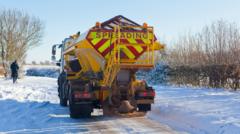Where Did All the Water Go? Hosepipe Ban Affects Millions!

Understanding the Hosepipe Ban: Implications for Yorkshire Residents and Beyond
The hosepipe ban in Yorkshire marks a crucial response to the ongoing water crisis exacerbated by a series of heatwaves and below-average rainfall. As millions grapple with the restrictions, the implications extend beyond merely filling paddling pools or washing cars. This article delves into the reasons behind the ban, its impact on various stakeholders, and the broader context of water management in the UK. We will explore the challenges faced by residents, farmers, and conservationists alike, while providing insights into the potential future of water supply in the region.
The Current Water Crisis in Yorkshire
Yorkshire is currently facing an unprecedented water crisis, compounded by a third consecutive heatwave and a record-setting dry spell. With reservoirs at only 53.8% capacity—substantially lower than the 80.9% average for this time of year—the region has been declared in drought by the Environment Agency. The situation has left many residents and farmers concerned about the future of water supply and the health of the environment.
Why Is There a Hosepipe Ban?
The hosepipe ban is a last-ditch effort to conserve water and prevent the region from descending into an arid state. Yorkshire Water has imposed restrictions that prohibit using hosepipes for various activities, including:
- Filling swimming pools
- Washing vehicles
- Watering gardens
This ban aims to save between 3% and 8% of daily water consumption, depending on public compliance. However, with temperatures expected to soar up to 34°C, many residents feel that the restrictions come too late and may not sufficiently address the water shortage.
The Impact on Farmers and Agriculture
Farmers, particularly those like Clare Wise on the North Yorkshire-Durham border, are feeling the brunt of the drought. The lack of rainfall has led to severe food shortages for livestock, prompting some farmers to sell animals to cope with the crisis. The following points highlight the challenges faced by the agricultural community:
- Increased feed costs due to diminished crop yields.
- Loss of livestock and potential income due to the inability to sustain animals.
- Long-term impacts on soil health and agricultural viability.
The dry conditions have left many farmers devastated, as the situation is described as “totally and utterly unprecedented.” Farmers rely heavily on rainfall for their water supply, and the ongoing drought is a stark reminder of how vulnerable the agricultural sector is to climate variability.
Impact on Residents and Gardeners
For Yorkshire residents, the hosepipe ban has elicited mixed reactions. While some understand the necessity of the restrictions, others are frustrated by the limitations placed on their daily activities. Grandfather Clive Key, for example, expressed his willingness to defy the ban, feeling entitled to use the water he pays for. This sentiment resonates with many, as water bills continue to rise amidst restrictions.
Gardening Challenges
Gardeners are particularly concerned about the health of their plants. Without the ability to use hosepipes, many are left to rely on watering cans, which may not be sufficient to sustain their gardens in the ongoing heat. Key challenges include:
- Increased risk of plant mortality due to insufficient water supply.
- Gardeners facing potential loss of hours spent nurturing their gardens.
- Emotional distress over losing beloved plants.
Jane Hewitt, Chair of Dore Garden Club in Sheffield, highlighted the emotional toll that losing plants can take on gardeners, while others remain committed to abiding by the law. The struggle between personal desires and collective responsibility underscores the complex nature of this water crisis.
The Broader Context of Water Management in the UK
The hosepipe ban in Yorkshire is not an isolated incident. Other regions in the UK are also facing potential restrictions, including Thames Water, which serves 16 million customers. The situation raises questions about the long-term sustainability of water resources across the country.
Concerns About Water Level and Quality
As the drought persists, concerns have arisen regarding not just the quantity of water but also its quality. Rachel Forsyth, Chief Executive of the Aire Rivers Trust, emphasized the risks posed to aquatic life and human health as water levels drop. Key issues include:
- Increased temperatures leading to fish mortality.
- Higher concentrations of harmful bacteria, such as E. coli, affecting swimming safety.
- Potential public health risks associated with untreated sewage dilution.
The relationship between water levels and ecological health is critical, and the ongoing drought threatens both. Conservationists and environmentalists are calling for immediate action to address these issues, as the consequences of inaction could be dire.
Efforts to Mitigate the Crisis
Yorkshire Water has outlined several initiatives aimed at mitigating the water crisis. These efforts include:
- Investing £8.3 billion into operations over the next five years, including upgrading treatment facilities.
- Rolling out smart meters to detect leaks more efficiently.
- Adding new boreholes to increase the raw water supply.
- Replacing 1,000 km of water mains to reduce leaks and improve infrastructure.
These measures are designed to enhance the region's resilience against future droughts and ensure a reliable water supply for residents, farmers, and ecosystems alike.
What Lies Ahead for Water Management in Yorkshire?
The hosepipe ban in Yorkshire serves as a wake-up call to the importance of sustainable water management. As climate change continues to manifest through irregular weather patterns, both residents and authorities must reconsider their relationship with water. The proactive measures taken now will lay the foundation for a more resilient water management system in the future. The necessity to adapt and find solutions will be more pressing as the climate continues to change.
FAQs
What areas are affected by the hosepipe ban in Yorkshire?
The hosepipe ban currently affects all regions served by Yorkshire Water, which includes many urban and rural areas in Yorkshire.
What activities are prohibited under the hosepipe ban?
Prohibited activities include using a hosepipe to fill swimming pools, wash vehicles, and water gardens. Residents can use buckets and watering cans as alternatives.
What are the penalties for defying the hosepipe ban?
Violators of the hosepipe ban could face fines of up to £1,000 if reported repeatedly for breaching the restrictions.
How can residents conserve water during the ban?
Residents can conserve water by employing water-saving practices, such as using drip irrigation systems, collecting rainwater, and using mulch in gardens to retain moisture.
Conclusion
The hosepipe ban in Yorkshire highlights the urgent need for a collective response to the ongoing water crisis. As we face the reality of climate change and its impact on our vital resources, it is essential for individuals, businesses, and authorities to work together. Understanding the importance of water conservation not only aids in navigating current challenges but also ensures the sustainability of our ecosystems for future generations. As we adapt to these changing conditions, what innovative solutions can we explore to secure a sustainable water future?
#WaterConservation #YorkshireCrisis #SustainableFuture
Published: 2025-07-11 06:00:00 | Category: News



